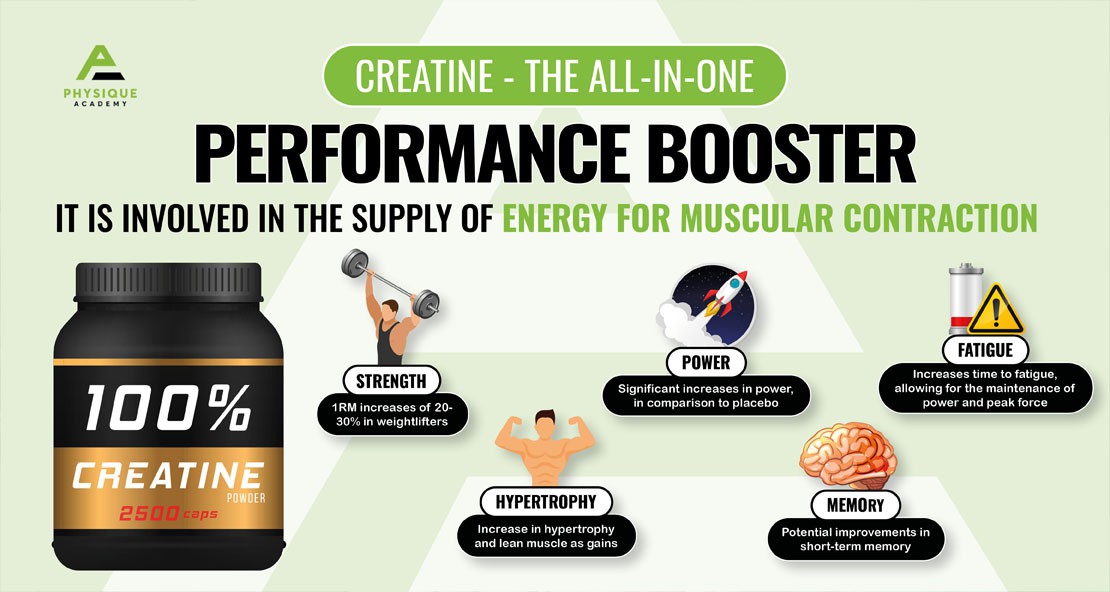Are you someone that is always looking to push their performance to the next level?
Your diet is pretty damn good, you train hard, and now you’re considering supplementation to get to that next level in the gym.
Supplementation can be mind boggling. Everyone and their dog want to sell you the latest and greatest product, promising huge results from a single pill that has little to no evidence backing it up.
But there’s one supplement out there that breaks the mould. You’ve likely heard of it too. It's one of the most popular and well researched supplements (5) on the planet for muscle building, cognition, and endurance.
I am of course talking about creatine.
Creatine is produced naturally in the human body and stored in muscle cells. That’s right, you already make this stuff. Your body creates it from the amino acids glycine and arginine. It’s also found in meat, eggs, and fish.
The problem is, there’s a pandemic of creatine deficiency particularly in highly active individuals, the elderly and those on a plant-based diet. All these factors, especially muscle damage from activity, increase the need for creatine supplementation.
When you supplement with creatine, your body primarily stores it as phosphocreatine, which is used to create more of a high energy molecule called ATP.
Think of ATP as a fuel source for explosive activities. When you have more ATP, your body can perform better and for longer. More endurance, more power, more lean body mass gains.
Creatine boosts muscle building indirectly in the following ways:
Higher workload: creatine enables higher volume in a workout, leading to muscle growth over time(1).
Increased cell hydration: draws more water to the muscles, providing a volumising effect that increases muscle growth(2).
Higher levels of anabolic hormones: creatine supplementation increases anabolic hormones like IGF-1(3).
But the benefits don’t stop there.
Creatine has also been shown to slow muscle breakdown and cognitive decline in the elderly. The additional phosphocreatine stores are released to combat stressors in the body (4).
In terms of dosing, 5g per day is all you need. I recommend a micronised form of creatine monohydrate called Creapure (it’s usually on the label). It’s extremely soluble and can be mixed with water, juices, shakes… hell, I usually just throw 5g in my mouth and wash it down.
So, what are you waiting for, add creatine to your daily supplementation regime and experience the benefits for yourself?
References
BECQUE, M., LOCHMANN, J. and MELROSE, D., 2000. Effects of oral creatine supplementation on muscular strength and body composition. Medicine & Science in Sports & Exercise, 32(3), pp.654-658.
DELDICQUE, L., LOUIS, M., THEISEN, D., NIELENS, H., DEHOUX, M., THISSEN, J., RENNIE, M. and FRANCAUX, M., 2005. Increased IGF mRNA in Human Skeletal Muscle after Creatine Supplementation. Medicine & Science in Sports & Exercise, 37(5), pp.731-736.
HAUSSINGER, D., 1993. Cellular hydration state: an important determinant of protein catabolism in health and disease. The Lancet, 341(8856), pp.1330-1332.
Parise, G., Mihic, S., MacLennan, D., Yarasheski, K. and Tarnopolsky, M., 2001. Effects of acute creatine monohydrate supplementation on leucine kinetics and mixed-muscle protein synthesis. Journal of Applied Physiology, 91(3), pp.1041-1047.
RB, K., C, M., CJ, R., M, G., S, L., EC, C., P, M. and AL, A., 2021. Long-term creatine supplementation does not significantly affect clinical markers of health in athletes. [online] PubMed. Available at: <https://pubmed.ncbi.nlm.nih.gov/12701816/> [Accessed 3 November 2021].
